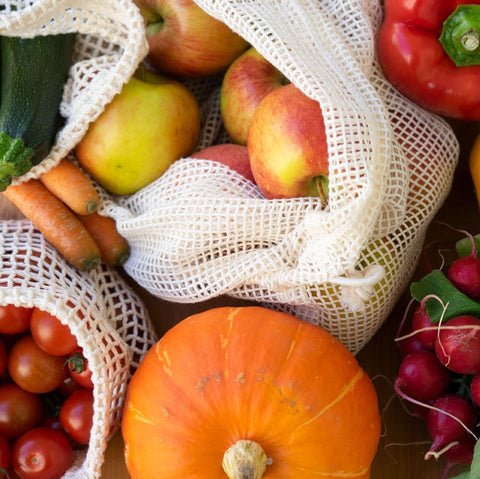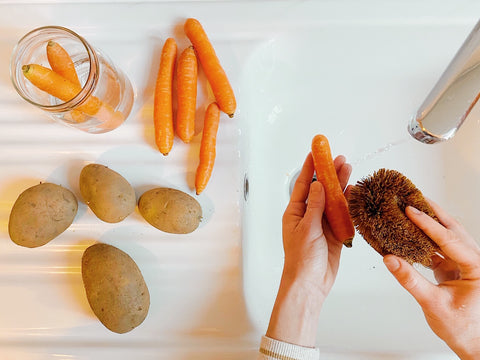Over the years, after using up what I have and slowly making changes to sustainable alternatives, I find so much joy in my (nearly) zero waste kitchen. If you’re wondering how to move towards a zero-waste kitchen, begin with the small steps listed below and work up to the big ones. Every small step makes a difference!
Here’s some of our top tips for how to move towards a zero-waste kitchen:
ZERO WASTE SHOPPING
Before we get into shopping, let’s note that the best option is to cook at home and use fresh ingredients (over packaged prepared ingredients/foods). For example, making yogurt instead of purchasing is much easier than it seems and saves countless containers!
Do you have a bulk store in your area? If so, you’re one of the lucky ones! They are starting to pop up as there is more awareness of the environmental impact of packaging so keep an eye out. If not, don’t worry, there is still plenty you can do. Favor local markets and purchasing “al banco” over the packaged alternatives. There are also more and more online bulk shopping websites offering paper packaging as well.

That includes both shopping bags and bags for fruits and veggies (yes, even to the supermarket!). Personally, I leave them next to the door or in the car to avoid forgetting when I head to the market. You can also bring your own containers, jars and bees wax wraps for other items purchased from bulk shops or al banco.
This one is still a challenge for me but I definitely see the benefits! Planning your meals in advance ensures you buy just the food you need for the week and not more. Less thrown away and less risk of food going bad.
The shorter the distance that your food has to travel, the less of an impact it has on the environment.
ZERO WASTE COOKING
The peel of many fruits and vegetables are not only edible but extremely nutritious! Just clean with a scrubber brush and eat the whole fruit/vegetable. Also, use food scraps to make broth before composting. It’s MUCH tastier and nutritious than the store-bought broth.
Storing your food in airtight glass jars (for the pantry) and properly in (or outside) the refrigerator for fresh food will make your food last longer and help avoid waste.
Avoiding meat and dairy is ‘single biggest way’ to reduce your environmental impact on Earth, according to many recent studies. This one may be challenging for some but even a reduction of animal products can have a significant positive environmental impact, far more impactful than buying an electric car or reducing flights. If you’re not ready to go 100% vegan, consider taking small steps reducing consumption of animal products through things like “una settimana vegana” or only consuming on the weekends. Looking for inspiration? Check out some of the wonderful profiles on IG such as Good Food Lab whose vegan recipes will have your mouth watering!
ZERO WASTE KITCHEN/CLEANING
I have an impressive collection of glass jars, but I can say I truly need them! And no, I did not invest in a new matching set. My jars are all different and are used for everything from storing lentils in the cabinet, to homemade broth in the freezer, to my homemade hair gel! Before buying new containers, see if something you have will do the job. 
At first, I hid the paper towels in a cabinet to avoid the temptation of reaching for them. After a while, we forgot they were even there and stopped buying them once we ran out! There are so many possibilities available now to avoid paper towels.
For example these compostable sponge cloths and sponge cloth rolls are super absorbent, can be washed in the dishwasher or washing machine, and are compostable after months of use!

Or opt for a cloth option which lasts a lifetime. If you have old towels, sheets or T-shirts, you can cut them up and store in a jar for use as paper towels (and wash them for reuse).
Did you know sponges are one of the dirtiest things in your house? They are an ideal breeding ground for bacteria. Also, they release tiny pieces of microplastics in the water system, which pass through filtration systems and end up in the ocean (then possibly eaten by fish and then by humans).
Switch to natural brushes which are made from sustainable materials reducing the impact from production as well as disposal. We love using this dish brush with changeable head for most dish washing, the coconut scrubber for scrubbing veggies, the pot/pan scrubber for hard to remove food and a natural bottle brush for cleaning bottles. This kit is a great starting point when looking for all the essentials for cleaning dishes!
Loofah’s are also a wonderful sponge alternative! They come from the loofah plant and are completely compostable. Check out our blog post all about the loofah here.
Traditional dish soap is the perfect match for dish brushes. They are super concentrated and last ages. Liquid soaps can require unnatural stabilizers and conservatives. Traditional Marseille soap is a great starting point for a general soap that can be used for everything around the house from dishes, to removing stains, or cleaning in general! It can be turned into a home made liquid dish soap or otherwise used directly with a brush.
No Tox Life is also a great option for heavy duty dish washing. It’s super concentrated and is equivalent to 3 bottles of traditional liquid dish soap!
We are so incredibly lucky in Italy to have compost pick-up publicly available. This means nearly everyone composts! If you want to go one step further, consider creating a home compost. There are some restrictions on public composting and what they can accept due to the method used and varies by commune, whereas home composting allows you to truly compost everything that is technically compostable. Plus, you can use the powerful resulting compost in your garden! Your compost is a nutrient-rich food product which improves your soil's condition and your plants and flowers will love it!
This is one of my favorite changes. I could not live without my Bee Bee wraps now! They are organic cotton cloths with bee’s wax or plant based wax (for the vegan version) that can be used over and over again to cover leftovers, conserve food, take snacks to go, and more. They last at least a year and then can be composted. You’ll never go back to plastic wrap!
ZERO WASTE TABLE
Why have cloth napkins gone out of style? They are so much more beautiful on a table and so easy to use. I had some extra fabric lying around and used it to make a bunch of cloth napkins. Everyone has a napkin with their name and we throw them in the wash when dirty.

Having a party? Avoid the temptation to stock up on single use cups, plates and silverware. Borrow from friends or check if there’s a stoviglioteca in your area to rent supplies for a small fee.
What other zero-waste kitchen tips do you have? Let us know in the comments!






